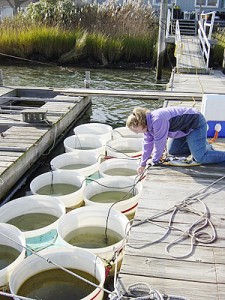Marine Sciences
 The M.S. and Ph.D. programs in marine science follow SoMAS’s unified flexible curriculum in Marine, Atmospheric, and Sustainability Sciences. A typical course of study for an M.S. student in marine science consists of a rigorous
interdisciplinary approach to oceanographic processes. This program is ideally suited
to prepare students for positions in research, management, environmental protection,
and resource development. Graduates will have a firm basis for more advanced study
and the tools and training needed for effective careers.
The M.S. and Ph.D. programs in marine science follow SoMAS’s unified flexible curriculum in Marine, Atmospheric, and Sustainability Sciences. A typical course of study for an M.S. student in marine science consists of a rigorous
interdisciplinary approach to oceanographic processes. This program is ideally suited
to prepare students for positions in research, management, environmental protection,
and resource development. Graduates will have a firm basis for more advanced study
and the tools and training needed for effective careers.
Marine science Ph.D. students learn to identify and solve problems in oceanographic science. It builds on a flexible, interdisciplinary program and prepares students to become effective, independent problem solvers. Students are free to emphasize their own interests in oceanography but are expected to acquire a broad base of interdisciplinary knowledge. Graduates are prepared to compete successfully for postdoctoral and faculty appointments as well as positions directing research at government or industrial laboratories, and managerial positions at not-for-profit and government agencies.
Example Curriculum
-
All SoMAS students take the core courses described under M.S. and Ph.D. Programs.
Marine science students have a wide range of backgrounds and specialties and therefore choose a wide variety of foundation courses. Marine science students commonly take 3 (for Ph.D., 2 for M.S.) of the following foundation courses:
- MAR 501 Physical Oceanography
- MAR 502 Biological Oceanography
- MAR 503 Chemical Oceanography
- MAR 504 Statistics and Experimental Design
- MAR 506 Geological Oceanography
- MAR 508 Foundations of Mar Science 1: Biogeochemical
- MAR 509 Foundations of Marine Science 2: Physics of the Ocean, Atmosphere, and climate
- MAR 516 Ecosystem Science for Fisheries Management
- MAR 545 Paleoceanography and paleoclimatology
- MAR 547 Geophysical Fluid Dynamics I
Ph.D. students take an additional 15 credits (9 credits for M.S. students) of specialty courses. Typical specialty courses for marine science students are
- MAR 507 Marine Conservation
- MAR 512 Marine Pollution
- MAR 515 Phytoplankton Ecology
- MAR 522 Environmental Toxicology & Public Health
- MAR 523 Marine Mammal Biology & Conservation
- MAR 532 Long Island Marine Habitats
- MAR 533 Instrumental Analysis
- MAR 538 Univariate Data Analysis
- MAR 540 Marine Microbial Ecology
- MAR 548 Geophysical Fluid Dynamics II
- MAR 553 Fishery Management
- MAR 554 Aquatic Animal Diseases
- MAR 561 Quantitative Fisheries Ecology
- MAR 569 Statistics with R
- MAR 570 Multivariate Data Analysis
- MAR 572 Geophysical Simulation
- MAR 578 Biology & Conservation of Seabirds
For the latest information regarding courses, please visit the Academic Catalog. To view SoMAS Graduate course offerings, please visit the respective program links:
- M.S. Program in Marine, Atmospheric and Sustainability Sciences
- Ph.D. Program in Marine, Atmospheric and Sustainability Sciences
Advising
SoMAS graduate students complete a thesis working closely with one or more of SoMAS’s excellent faculty. By the end of their second semester of study, all students must choose an advisor who will guide their research, approve course selections, and oversee their efforts toward degree completion.
Prospective Students
To find a SoMAS faculty member whose research interests match yours, visit our faculty and research pages.
Please visit our Graduate Student Admissions page for application details.
